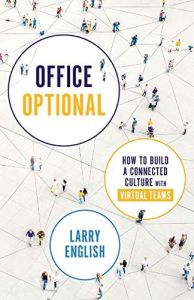Join getAbstract to access the summary!

Join getAbstract to access the summary!
Larry English
Office Optional
How to Build a Connected Culture with Virtual Teams
Larry English, 2020
What's inside?
You and your remote workers can build a strong virtual culture and increase your competitive advantage.
Recommendation
Consultant and author Larry English believes in building a strong virtual culture as workplace norms shift in the wake of the coronavirus. Researchers predict 73% of teams will include remote workers by 2028, but few companies make building and maintaining their culture with all workers – including virtual ones – a priority. Many don’t even talk to new hires about culture, says English. He shares applicable tips to help you manage a remote or hybrid workforce, from screening for cultural fit to clarifying your core values. Leaders at all levels can benefit from this accessible step-by-step guide to fortifying your culture.
Summary
About the Author
Larry English is the co-founder and president of the management and consulting firm, Centric Consulting.























Comment on this summary